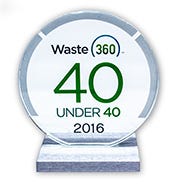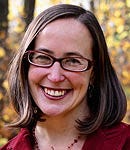Candy Castellanos Turned her Passion for the Environment into a Career
Castellanos recently spoke with Waste360 about how she turned her passion for the environment into a career and the challenges she’s currently seeing in the industry.
Candy Castellanos, statewide resources section manager for the Washington Department of Ecology, was born on Earth Day and has always been interested in the environment and spreading awareness of the planet. Coincidence? Maybe, maybe not
Castellanos kicked off her career by starting an Earth Club at her grade school, which has continued to grow and still exists today. Since then, she helped Waste Management launch its Recycle Corps internship program for college students and in 2013, she organized and hosted the Washington State Recycling Association’s first-ever Recycled Fashion Show.
In addition to those efforts, Castellanos has earned herself a number of awards, including a Waste360 40 Under 40 award and a number of awards from the Solid Waste Association of North America.
“Candy launched her professional work for positive change in environmental education in 2002. In 2009, she discovered the wild world of recycling education and started dedicating her social-marketing-savvy and high-velocity energy to the materials management industry,” says Deanna Seaman. “Her dedication was apparent from day one, and she jumped right into a leadership role in the industry.”
Castellanos recently spoke with Waste360 about how she turned her passion for the environment into a career, the challenges she’s currently seeing in the industry and the Washington Department of Ecology’s goals for this year.
 Waste360: What led you to want to have a career in the waste and recycling industry?
Waste360: What led you to want to have a career in the waste and recycling industry?
Candy Castellanos: I was born on Earth Day, and I have always been interested in the environment and spreading awareness of the planet.
During the summer after 7th grade, I was selected to go to a leadership conference at Stanford, and I came back home with new words like “grassroots.” While I was there, I saw my first motivational speaker, and they really lit a spark in me about the types of things that I wanted to be involved in.
After attending the conference, I decided to start my own club at school called Earth Club, which is actually still around to this day and is now districtwide. With Earth Club, students have the chance to participate in events and volunteer work like picking up litter in the park during Earth Week.
I also worked with a sponsor teacher at my school to figure out how much paper was being thrown away at the school. We had the trophy cases cleaned out and in one week’s time, we filled the trophy cases with all of the paper that was being thrown away in the classroom. With that visible showcase, we were able to make the case for the school’s first recycling program. We also helped recycle cans and bottles, which helped fund the end-of-year “Fun Days” and activities for each grade.
All of those opportunities were a great start for me and my career. As I went through school, I ended up studying environmental education for a long time and after a while, I shifted gears and studied political science and environmental education.
In 2009, I reached out to the CEO of a startup company that I was following here in Seattle, and I ended up getting a job there designing its outreach and education programs. During that process, I got really involved in the local waste and recycling community, and I started participating in the Washington State Recycling Association. After a while, I ran for the board, and now I am the vice president.
Through my experience in that first outreach and education job in recycling, I was actually recruited to be the senior manager for outreach and education at Waste Management. While I was there, I received the funding and support I needed to create a recycle core program, which allowed 12 college students per year to go through a 12-week, full-time internship program. With this program, students received hands-on education so they could get a real feel for the industry.
From there, I was recruited over to the Washington Department of Ecology to lead its statewide resources section.
Waste360: Tell us about your role as statewide resources section manager for the Washington Department of Ecology.
 Candy Castellanos: For the Washington Department of Ecology, there are a number of different programs, and the waste and resources program has a number of different section managers. I am the section manager for the Statewide Resources group, which has 21 staff members and 17 different programs under its umbrella. Some of the programs that it includes are product stewardship, biosolids, recycling, composting, data use and strategy, public participation grants and coordinated prevention grants. Basically, we encompass all of the statewide programs and provide support for outreach, education and rulemaking for the laws centered on waste diversion, prevention, recycling and composting.
Candy Castellanos: For the Washington Department of Ecology, there are a number of different programs, and the waste and resources program has a number of different section managers. I am the section manager for the Statewide Resources group, which has 21 staff members and 17 different programs under its umbrella. Some of the programs that it includes are product stewardship, biosolids, recycling, composting, data use and strategy, public participation grants and coordinated prevention grants. Basically, we encompass all of the statewide programs and provide support for outreach, education and rulemaking for the laws centered on waste diversion, prevention, recycling and composting.
I am also on the team that helps implement the state’s solid and hazardous waste management plan. Part of my work with that is that I am the management liaison for both our materials management work group and our moderate risk waste group. In addition to that, I help support the product stewardship team and a number of other programs.
Waste360: What are some of the department’s goals for this year?
Candy Castellanos: This year, we are focusing on reviewing a number of rules and regulations that support solid waste, recycling, composting and waste prevention. We are also doing some investigation on our grant, outreach and education programs and figuring out how to incorporate solid marketing strategies into each of those programs.
I believe that we have the opportunity to lead an example on the state level by showing that you don’t just need to manage programs through an output perspective. You really need to look at the outcomes in detail and figure out the best way to influence positive behavior change and provide support.
For me, I have spent a lot of time working with an amazing group of individuals to try and understand the best way to engage with our communities. For some time now, we have been trying to create an engagement method that works with different multicultural language communities. We want to make sure that all of our community members are involved in the conversation around the programs and opportunities that are available. Ultimately, we want to create a large conversation about preventing waste so that everyone is on the same page. Our efforts have been going well so far, and people are honestly just very excited to be involved and to share their opinion.
Waste360: What challenges are you seeing in the waste and recycling industry right now?
Candy Castellanos: Over the past six years in this industry, I have seen a major disconnect between each of the core elements of the entire waste and recycling system. The industry has an amazing interconnected system that allows all of the programs to happen, but the problem is that none of the programs are talking to each other or working together.
Personally, I would love to see an evolution of the recycling, composting, waste prevention and reuse systems. I think there needs to be a new mechanism where all of the different pieces of the systems have a way to talk to each other, give each other feedback and include each other in a logical way.
For example, those who design MRF equipment aren’t necessarily talking to the people who are tracking packaging. While there are some people who are trying to build the bridges between these different silos, the system isn’t functioning as a whole yet.
We also have individual governments that are creating collection and education contracts, which include lists of what’s in and what’s out of the bin. And I have yet to see a contract conversation that includes conversations with the local MRF operators or local design schools, for example. Decisions are being made in a vacuum and while that has been working out ok, I think a lot of what we are seeing in the industry could be better supported and more sustainable if there were actually a mechanism for all of the different spokespeople for the different programs to talk to each other. I have seen attempts over the years, but I haven’t seen a wholesale movement toward understanding the interconnectedness of this system.
Waste360: What advice do you have for someone who is looking to get into the waste and recycling industry?
Candy Castellanos: I would highly advise them to take any job shadow, work study or internship opportunity because those opportunities will give them a chance to try on those different organizations and roles. I also think that getting involved in a local or state association and attending local workshops, seminars and conferences is very beneficial because they’ll gain knowledge and an understanding of the industry.
In this industry, there isn’t a lack of challenges to think about and overcome. We really need innovative and creative people who can familiarize themselves with the problems in our industry and work to solve them. We also need people who think of every aspect of the industry, from policy, outreach and education to engineering and designing better systems to manage the materials that are in our waste stream.
About the Author
You May Also Like




